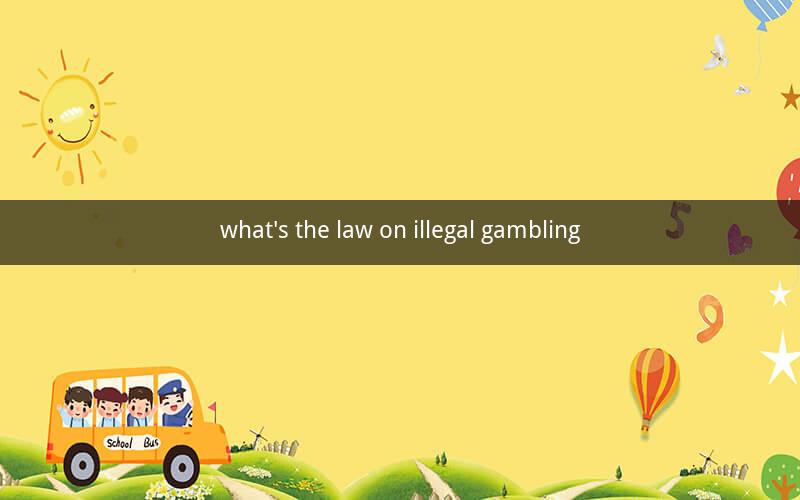
Table of Contents
1. Introduction to Illegal Gambling
2. Definition of Illegal Gambling
3. Legal Framework in Different Countries
3.1 United States
3.2 United Kingdom
3.3 Canada
3.4 Australia
4. Types of Illegal Gambling Activities
5. Penalties for Illegal Gambling
6. Impact of Illegal Gambling on Society
7. How to Identify Illegal Gambling
8. The Role of Technology in Combating Illegal Gambling
9. Conclusion
1. Introduction to Illegal Gambling
Illegal gambling refers to any form of betting or wagering that is conducted without the proper licensing or authorization from the relevant gambling authorities. It is a significant issue worldwide, affecting both individuals and society at large. Understanding the laws and regulations surrounding illegal gambling is crucial for those involved in the industry or simply curious about its implications.
2. Definition of Illegal Gambling
Illegal gambling encompasses a wide range of activities, including sports betting, lottery ticket sales, online gaming, and casino games. It is characterized by the absence of legal permission or licensing, making it illegal in many jurisdictions. The key factors that differentiate illegal gambling from legal gambling are the lack of regulation, the absence of consumer protection, and the potential for fraudulent activities.
3. Legal Framework in Different Countries
The legal framework for illegal gambling varies significantly across different countries.
3.1 United States
In the United States, the legality of gambling is primarily determined at the state level. While some states have legal regulated gambling industries, others have banned it entirely. The Federal Wire Act of 1961 restricts sports betting over telecommunications networks, but it does not prohibit online gambling or state-regulated sports betting.
3.2 United Kingdom
In the United Kingdom, gambling is legal, but it is regulated by the Gambling Commission. Illegal gambling is prohibited and can lead to penalties for those involved in operating or participating in such activities.
3.3 Canada
Canada has a complex legal framework for gambling, with provinces having the authority to regulate gambling within their borders. Illegal gambling is generally prohibited, but there are exceptions for certain types of gambling, such as bingo and lottery games.
3.4 Australia
In Australia, gambling laws vary by state and territory. Some forms of gambling are legal and regulated, while others are illegal. The Interactive Gambling Act of 2001 restricts the provision of certain forms of online gambling to Australian residents.
4. Types of Illegal Gambling Activities
Illegal gambling activities can take various forms, including:
- Unlicensed online casinos and sportsbooks
- Offshore gambling sites
- Underage gambling
- Betting on events that have not yet occurred
- Illegal sports betting rings
5. Penalties for Illegal Gambling
The penalties for illegal gambling can vary widely, depending on the jurisdiction and the severity of the offense. They can range from fines and imprisonment to the closure of gambling operations and civil lawsuits. Individuals caught engaging in illegal gambling may also face penalties such as fines, probation, or community service.
6. Impact of Illegal Gambling on Society
Illegal gambling has several negative impacts on society, including:
- Increased crime rates
- Financial hardship for individuals
- Exploitation of vulnerable populations
- Decreased tax revenue for governments
7. How to Identify Illegal Gambling
To identify illegal gambling, individuals should look for signs such as:
- The absence of a gambling license
- Unregulated websites or platforms
- Unusual betting patterns or outcomes
- High stakes and pressure to bet
8. The Role of Technology in Combating Illegal Gambling
Technology plays a crucial role in combating illegal gambling. Tools such as blockchain and artificial intelligence can help identify suspicious activity, track the movement of funds, and prevent fraudulent transactions. Governments and regulatory bodies also use technology to monitor and enforce gambling laws.
9. Conclusion
Illegal gambling is a significant issue that affects individuals and society. Understanding the laws and regulations surrounding illegal gambling is essential for preventing and combating this problem. By implementing effective regulatory frameworks and utilizing technology, governments can work towards creating a safer and more responsible gambling environment.
10 Questions and Answers
Question 1: What is the main difference between legal and illegal gambling?
Answer: The main difference is the absence of proper licensing or authorization, making illegal gambling a violation of gambling laws.
Question 2: Can individuals face legal consequences for participating in illegal gambling?
Answer: Yes, individuals can face fines, imprisonment, and other penalties for participating in illegal gambling activities.
Question 3: How do governments regulate gambling?
Answer: Governments regulate gambling through licensing, oversight, and enforcement of gambling laws.
Question 4: What are some of the negative impacts of illegal gambling on society?
Answer: The negative impacts include increased crime rates, financial hardship, exploitation of vulnerable populations, and decreased tax revenue for governments.
Question 5: How can individuals identify illegal gambling activities?
Answer: Individuals can identify illegal gambling by looking for signs such as the absence of a gambling license, unregulated websites or platforms, and unusual betting patterns.
Question 6: How does technology help in combating illegal gambling?
Answer: Technology helps by identifying suspicious activity, tracking the movement of funds, and preventing fraudulent transactions.
Question 7: What role does the Gambling Commission play in the United Kingdom?
Answer: The Gambling Commission regulates gambling in the United Kingdom, overseeing licensed operators and enforcing gambling laws.
Question 8: How do states in the United States regulate gambling?
Answer: States in the United States have the authority to regulate gambling within their borders, with some states having legal regulated gambling industries while others have banned it entirely.
Question 9: Can online gambling be legal in some countries while illegal in others?
Answer: Yes, online gambling laws vary by country, with some allowing it while others prohibit it.
Question 10: What can be done to prevent illegal gambling?
Answer: To prevent illegal gambling, governments can implement effective regulatory frameworks, enforce gambling laws, and utilize technology to monitor and combat illegal gambling activities.